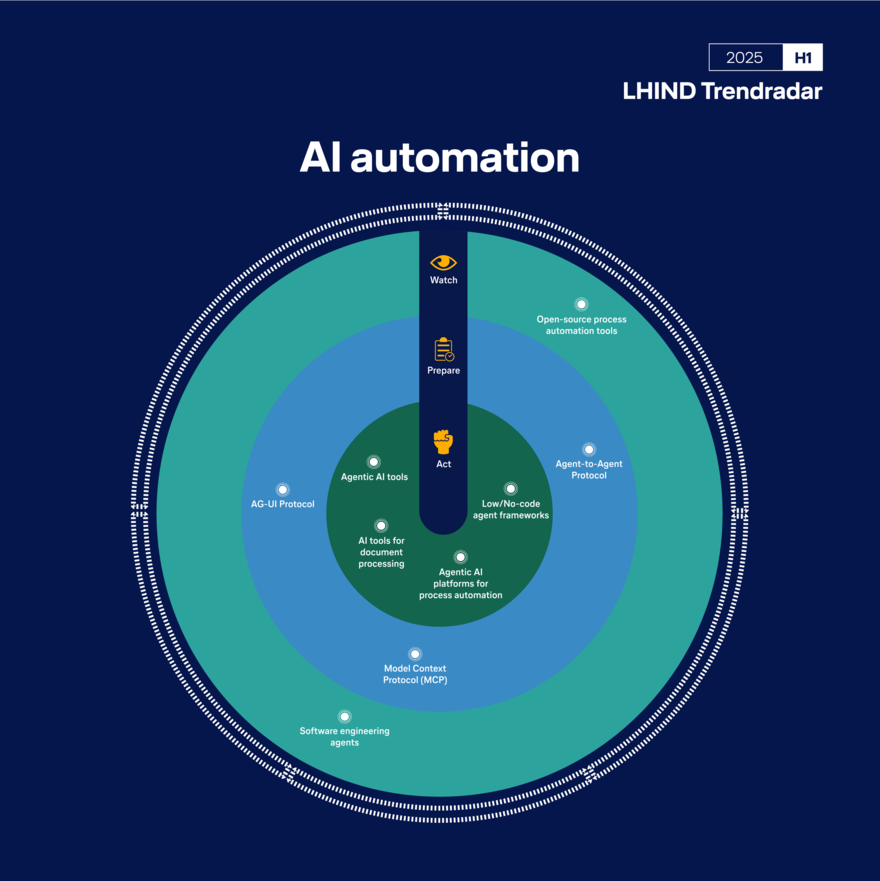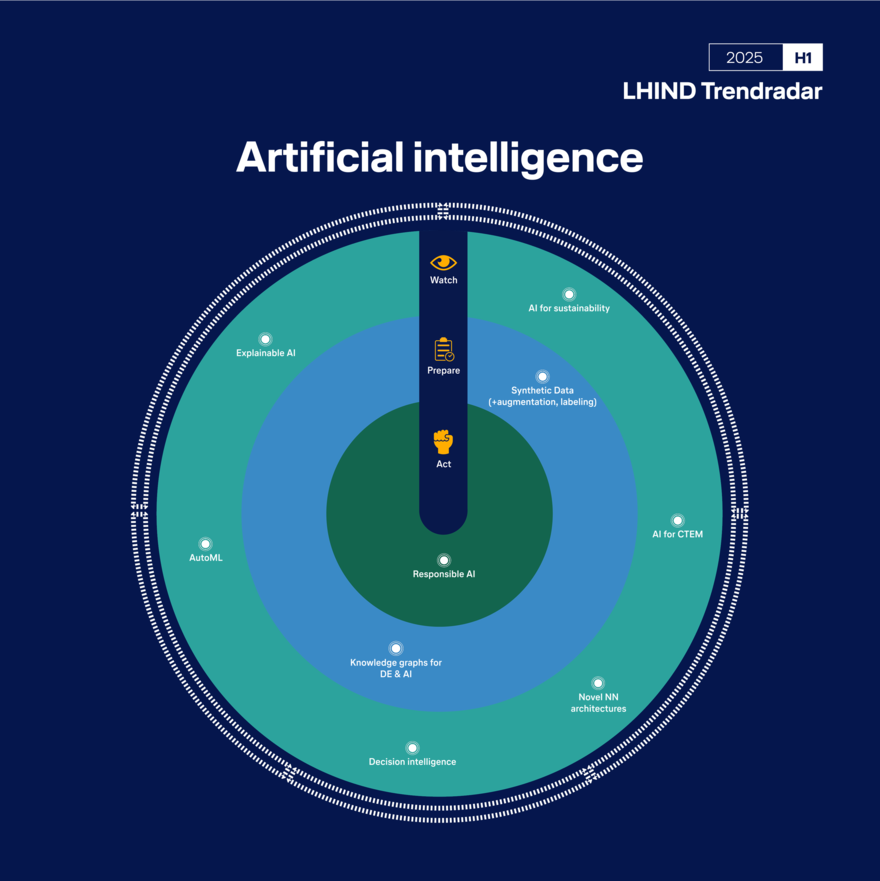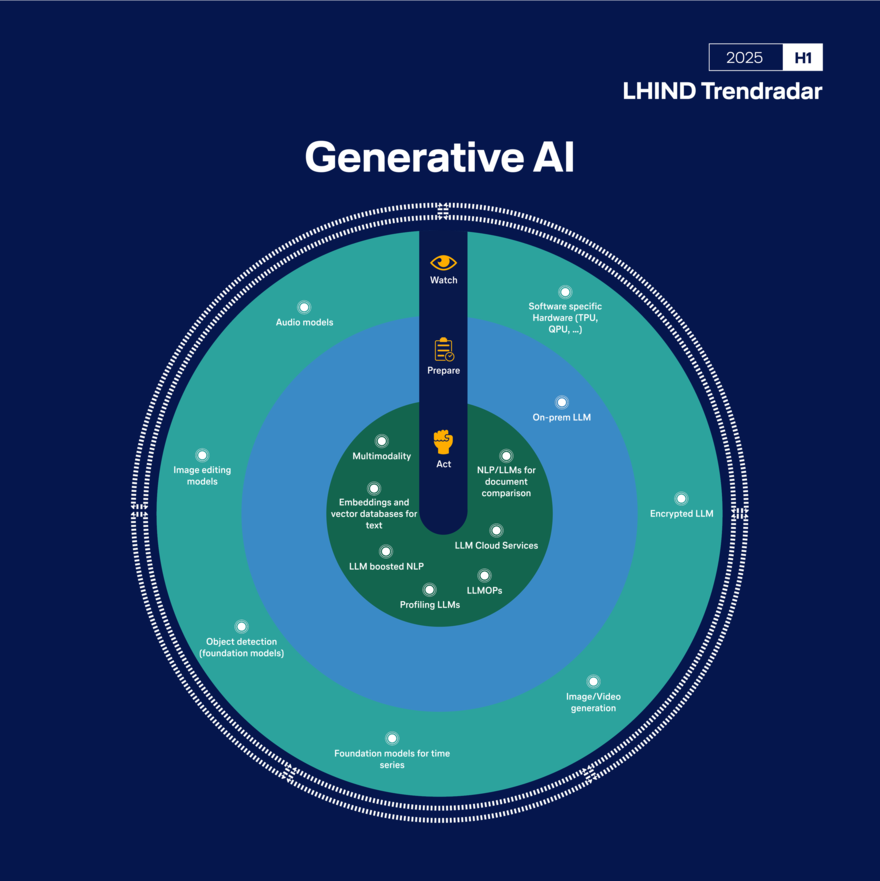The rapid development of artificial intelligence is challenging companies worldwide. The LHIND Trend Radar AI & Data Analytics from Lufthansa Industry Solutions (LHIND) offers decision-makers guidance and helps them recognize and implement future-oriented technologies early on. The latest edition of the LHIND Trend Radar reveals that artificial intelligence, process automation, and data platforms are evolving from hype to productive reality. Several technology fields are taking action, while others remain in observation mode.
Norderstedt, July 3, 2025 - Lufthansa Industry Solutions has published the new Trend Radar H1/2025. The analysis shows current developments in artificial intelligence, data platforms, and process automation. The focus is on generative AI and agent-based automation solutions, among other things. "Companies should use production-ready AI and data solutions strategically and invest in future-oriented technologies," emphasizes Bartlomiej Jezierski, IT Consultant AI & Data Analytics at LHIND. "Platform integration, data expertise, and the responsible use of AI will be at the heart of the next innovation cycles."
The latest LHIND Trend Radar helps companies make well-informed assessments of technological developments and use them strategically. The goal is to distinguish between short-term trends and long-term innovations and recognize competitive advantages early on.
This evaluation is based on LHIND expert analyses, supplemented by market research, customer feedback, and reports from leading analysts. Trends are regularly reviewed, prioritized, and classified into three action categories: "Act," "Prepare," and "Watch."
Top trends: Fields of action and recommendations
Agent-based AI, Generative AI, and modern Data Architecture are rapidly transforming corporate IT. AI-supported assistance systems and vector-based data structures are being used more and more for productive purposes. Topics such as the responsible use of AI, decentralized data architectures, and synthetically generated training data are becoming more important strategically. Technological progress brings new applications, roles, and responsibilities.
The results of the Trend Radar 1/2025 at a glance:
- Agentic AI and process automation are becoming more relevant
Agent-based AI and low-code platforms are becoming more widely accepted as practical solutions. AI-supported document processing has arrived in real-life applications. Open-source solutions show promising potential but still require further development. New role profiles, such as "agentic software engineers," are becoming increasingly relevant. - Responsible AI is in focus as new technologies rise
Implementing Responsible AI is essential for regulatory compliance and should be actively promoted. Early engagement is recommended for forward-looking topics such as synthetic data and knowledge graphs. Technologies such as explainable AI, auto-machine learning (AutoML), and innovative network architecture are currently in the early stages of observation and evaluation. - Technology: AI has brought data engineering to the forefront like never before
Data engineering is more important today than ever before, especially due to the influence of AI and the desire for data democratization. Handling unstructured data, often necessary in an AI context, has become crucial. In this environment, data catalogs and metadata management are of central importance, significantly changing the accessibility and usability of information. In addition to these technologies, the concept of small data is becoming increasingly important. Small data enables valuable insights to be gained from less extensive data sets in a specific and often very agile way. In combination with tools and platforms, it opens up innovative approaches to data analysis. - Generative AI: From the idea to concrete application
Large language models (LLMs) are already being used productively — for example, in document analysis, semantic searches, and named entity recognition. Multimodal models, vector databases, and specialized cloud services are also becoming increasingly important. Meanwhile, on-premises solutions and new model variants for time series analysis are being tested.
"Agentic AI and low-code platforms are taking automation to a new level. Now, it's time to consider responsibility, scalability, and governance," says An Dang, an IT consultant specializing in AI and data analytics at LHIND. "Technology alone is not enough. Clear guidelines and new skills are needed on the team."
The LHIND Trend Radar on Data Analytics and Artificial Intelligence is published every six months. The H2/2025 Trend Radar will be published in November 2025.




